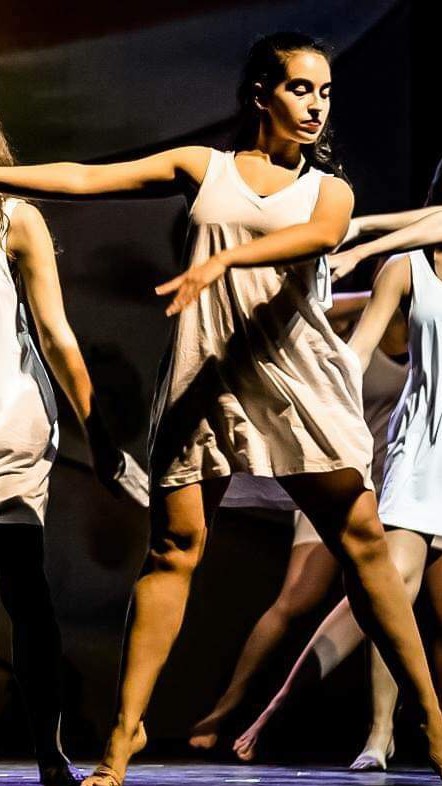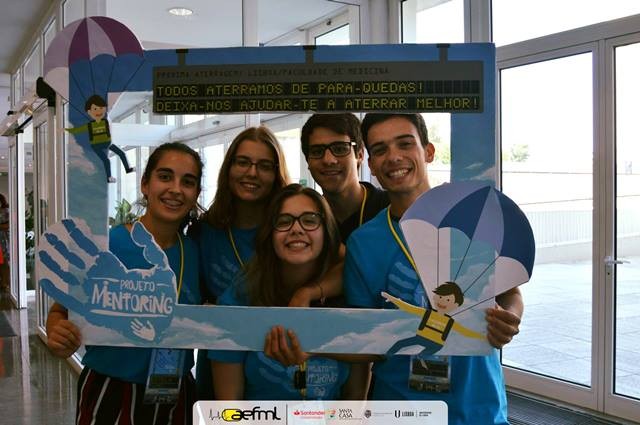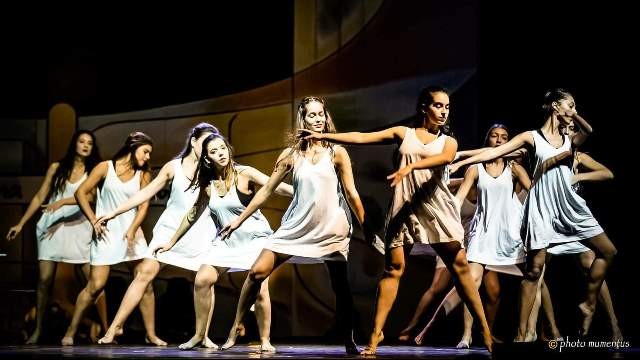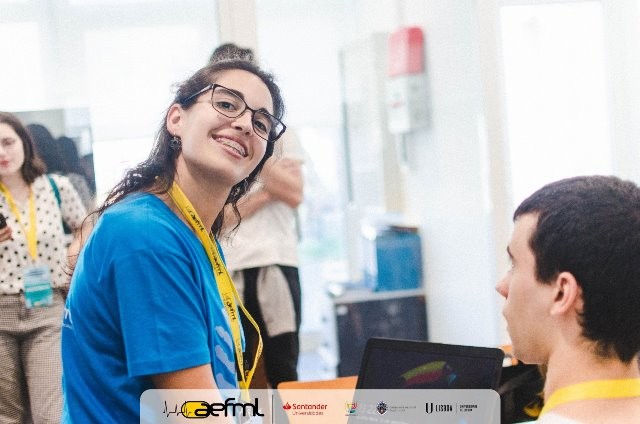Her name is Estela Flambó. A student now starting her 3rd year of Medicine, she presents herself in a timid and reserved manner, something apparently contradictory at first glance, as when she speaks in front of a large audience, she can have the presence of a well-trained ballerina.
 With a sweet, delicate voice, yet with a clear idea of what she wants and where she wants to go, there is a leadership instinct in her with which she willingly takes up her time. For all her school life and until the 12th year, she got used to being elected class representative. She always liked being the intermediary between staff and students.
With a sweet, delicate voice, yet with a clear idea of what she wants and where she wants to go, there is a leadership instinct in her with which she willingly takes up her time. For all her school life and until the 12th year, she got used to being elected class representative. She always liked being the intermediary between staff and students.
This dual personality of Estela, which in reality is just an intelligent balance of forces, might be rooted in her surname Flambó, whose History comes from the French at the time of the County of Portugal. A fighter and leader, she doesn't give up pursuing the path she believes in. But it's surely not a coincidence that her dad, an Artillery Lieutenant-Colonel in the Armed Forces, is strict enough, explaining the rules of life to her well. Provided that she took on responsibility, she could do and be anything she wanted. Her mum, a Maths Teacher, didn't change either her angle on logic or her priorities in life, but maybe some of her own sweetness rubbed off on her. Always a good student, Estela managed to swim competitively, while also learning to dance and fine-tuning her accent to speak perfect English. Her secret from an early age was in time management, always believing that she could rise to every challenge, which became more and more demanding.
As an only child, she says that she was always used to being as pragmatic as she was responsible, and if "it needs doing, it really needs doing." This is why we believe that, barely having joined the Faculty, she decided that it was also the moment to face responsibility "head on."
"Above all, to help" is how she answers when I ask her what really motivated her to make this life choice. She dreams of being a doctor and joining a group like "Doctors without Borders." This spirit of concern for others is what is meant by "a fascination for the human body."
She was in the 9th year when she met a teacher that completely changed her perspective on life and her interest in looking inside the body. She knows, however, that she won't become a "laboratory worker," because she needs contact with others, with patients.
Having joined the Faculty of Medicine, a choice she has never regretted, she came with the outlook that she didn't want to only study. It was when she was researching the best faculty to choose that she came across the sites for the AEFML and its Course Committees. She realised that this would be a great way to start taking a hands-on approach in her new place of action. In her first week of introductory classes, she met the 2nd-year Course Committee that welcomed them. Estela volunteered to join the Committee that would represent 1st-year students. In fact, she has stayed on the Course Committee ever since she joined. But as she has never outgrown her curiosity for more, and representing others is always a priority for her, she has now also joined the Student Group on the Pedagogical Board.

With none of the commitments she has already accumulated being enough, she has also just been awarded a scholarship to coordinate the Mentoring Project, which aims to support new students to the Faculty and integrate them.
But who is this student who has no fear in being on the front line and, yet, on the surface, is so delicate that you can be confused by her fragility?
Why this Faculty?
Estela: First for its course programme and then for its offers from the Student Association. The first activity that soon called my attention was the volunteering bank, which I haven't even done yet, but it made me realise that there is a lot that can be done. I looked for other options, but it was here that I found the most variety.
What is a Course Committee and what do they do?
Estela: I always have the same answer, "it's like a class representative, but for 400 students." It's representing and helping 400 students with the slither of free time that we have. If in the 1st year we volunteer to join the Course Committee, from then on it is always chosen by a list and a vote. In the 2nd year, which has now finished, I was the coordinator. I have now handed over to Miguel and am only the course commissioner.
What are the characteristics that a person needs to have in order to represent their year?
Estela: Try to be as accurate and objective as possible, as it is sometimes up to us to end a stalemate. In other words, some students come to us with complaints and we need to be able to listen and pass them on to the Committee, but it is also important to evaluate and accept when we disagree, and express this calmly. There needs to be great sensitivity to convey the students' opinions to the Chair, especially when they are not so positive.
A lot of diplomacy is needed, right?
Estela: Indeed. A lot.
Do they create antibodies from your course mates when we say "no" to them on an issue they complain about?
Estela: No, because they know we're there to help them. In the end, a solution can almost always be found, without resorting to conflict.
How many student members are there on the Course Committee?
Estela: It depends each year. My year was really representative. We had 23 members. This year it's gone down to 20.
And what is your day-to-day role?
Estela: We try to reconcile different wills and ideas. In other words, if the Committee has a certain idea, we try to reconcile the students' ideas with theirs (the Committee's). We try to get things to happen. Every day students send us emails and every day we answer them. Then we speak with the Boards and try to find solutions.
Let's go back to the 1st year, where someone on the Committee is representing their year. For someone who has just joined an Institution where there is a formality that is still very hierarchical, how do they communicate complaints and suggestions to the Committee? And how do they take this?
Estela: Normally, in principle, we feel belittled a little bit... Because it takes time to gain credibility which we want to have from the start. We're first-year students, we've just arrived, we have no idea how the system works and we're sitting at a table with board members, and we don't know where we're supposed to sit. (Hesitates) Just the gesture of sitting in a certain place can sometimes be a problem... At the beginning we entered and waited for them to sit down to know where to go. It's complicated. But we're working on it. As long as we maintain our stance...
What stance should you maintain?
Estela: A friendly one. Above all. Respectful. If we want to express an opposing view, we need to know when to express it. Being very diplomatic without starting to criticise. We can't get what we want through criticism, but through willingness, we can show that we want to develop projects and ideas.
So the 1st year was the most difficult, and then it got easier?
Estela: Exactly, I'd even say it was the first semester. From then on, we were more aware, and from speaking to the Course Committee of the year above, we learnt the approaches to take for each committee member. It helps a lot! Sharing your experiences with other years really speeds up the process. A well-established relationship is half the battle for things to work. And this has been shown. Proof of this was in the 2nd year.
Having taken on these rules from some procedure, have you interacted well and been received well by committee members since then?
Estela: Mostly yes. We've been able to make changes: for example, in Anatomy we've managed to change the exam formats. If before it was a gymkhana (a sequence of 4 rooms where we answered questions, in which in each room there was a certain amount of time, after which we had to leave), it is now a type of oral exam, with two Assistants and the student. This has helped ease the pressure and improve our time management. And the student's Professor is always present, which gives us some added comfort. But clearly there are situations where the committee members aren't so receptive to our suggestions.
Why is it so important for you to represent others?
Estela: There's a feeling of usefulness. I'm not here just to study and just for the sake of it, or for my own benefit. It makes me very happy that every morning, I barely get to the Faculty, I open my computer and read emails from the Course Committee. It's a sense of gratitude that's reflected in my relationship with others.
At the end of a year, is it possible to be recognised by the almost 400 students in a single year?
Estela: No, but a lot of them do. Those who really follow the home / class and class / home structure will find it hard to create a network of contacts. But in time we meet people and cross paths. Especially in the 2nd year, we have a very funny way of making timetables, because we're in various classes with different students. As such, students end up mingling. This can potentially lead to human relationships.
But over the academic years you also change as people, don't you?
Estela: Indeed... I'm slightly scared about this...
Scared? Why?
Estela: Because I feel that, as human beings, we don't just dedicate ourselves to a single issue. We're much more diverse than this and I think that "only being Doctors" closes people off to the world. I have friends who are so focused on Medicine, and nothing else, that despite having other interests, they don't give themselves the time to build on them.
I heard on the Open Day that there were a variety of activities to do at this Faculty, besides just being a student. Why is that people have potential but they don't want to exploit it? Is it because they have too much work?
Estela: It's because they believe that they can't balance both aspects, so they end up just studying. Anyone can manage to balance everything if they really like what they do. I really like everything I do. And the fear that some people have is that there will be a point when they will have done everything as well as being students, they'll have got good grades, which they then fear that something bad will happen, if they take on other projects alongside. So it's better to play it safe and not take on too much. At least that's my perspective.
So their fear is that, while time passes, more and more is closed off to them and then they're "just a Medic," no longer being able to see anything more?
Estela: I'm scared of starting clinical practice and focusing on this and this alone. One of the things I like doing the most, besides studying Medicine, is dancing and I'm scared that, one day, I won't manage to do both.

What type of dance?
Estela: I have lessons in ballet, jazz, lyrical jazz, broadway, Latin dance.
Is this dancing side a search for balance to be more free?
Estela: And it's also the best way to express myself without having to do it explicitly.
Are you shy, Estela?
Estela: I used to be more than I am now, but I feel that I need time with someone to really be able to open up to them. And with dance we are all there for the same reason, we're a group dancing.
This Faculty is known for having strong connections with shows: Medicine Night, the Cultural Soirée. There you could perfectly apply those non-verbal techniques, but which really express...
Estela: I was the coordinator for the dance at last year's (2018) Medicine Night, and I've also taken part in the Cultural Soirée!
How does it feel being a shy person that is suddenly thrown on stage in front of hundreds of spectators?
Estela: I love being in shows. It's a tad contradictory because there I have enough self-confidence to do it... and I enjoy it. In that moment I have no problems with people looking at me.

Have you had to do solos before?
Estela: I have! And it feels good! I don't think a lot if I'm being watched, I just take the opportunity to dance. Just dance.
What do you expect for your 3rd year, where you'll continue to represent others?
Estela: I expect some work, but I'm hoping for a calm year. And if it is, it means that people are happy with the course and the working environment. As I really like being here at the Faculty, when I witness some type of conflict that ends in criticism and frustration, it makes me feel a bit sad. Because I want others to like it as much as I do. So, as Course Committee representatives, having less people talking to us will be a sign that they're happier and that the year is going well.
Afterwards, I honestly hope that Mentoring will also grow and that this help from the oldest to the youngest students will strengthen. Mentoring is an open door that welcomes us and says: "you are not here to compete, but to help one another."

Because you never forget the principle that motivated you, when I ask you where you see yourself in the future, you immediately aim for Internal or Intensive Care Medicine. "I don't want to be in an operating theatre without knowing anything about that person's life, you know? I want to form a relationship with them, accompany them." She argues that the nicest part of Medicine is the doctor-patient relationship, she believes that patients cause commotion for doctors and that years of experience won't take that same commotion from you. She knows that she could end up spending sleepless hours studying a rare case and end up strengthening the relationship between those who are most fragile and those who can treat them. But this is what she wants.
For now, she says she is living the best years of her life in an Institution that she talks about with pride as if it were a club where she played until her last breath. Every year that passes, Estela says that she is growing every day. "In this family," she tells me, "I'm learning to be a doctor, but more than this, I'm learning to be a good person."
Estela is moved by a beautiful magic of someone who truly believes that they will be a part of the brave people who will change the world through goodness.
She was one of the people chosen for the Institutional video. How about we all get to know Estela?

Joana Sousa
Editorial team


